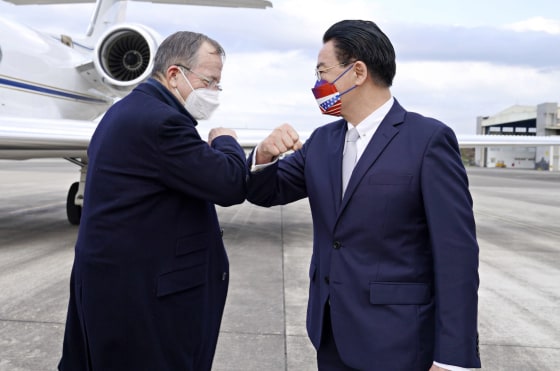TAIPEI, Taiwan — The U.S. stands firmly behind its commitments to Taiwan, a visiting U.S. delegation said Wednesday as Taiwan President Tsai Ing-wen vowed to work more closely with allies in response to what she called China's growing military threat.
The delegation of former top U.S. security and defense officials, which was sent by President Joe Biden, is visiting Chinese-claimed Taiwan against the backdrop of Russia's invasion of Ukraine, which is being closely watched on the democratic island.
Collaboration between the U.S. and Taiwan is stronger and more expansive than ever before, said retired Adm. Mike Mullen, a former chairman of the U.S. Joint Chiefs of Staff, who is leading the delegation.
"The United States will continue to oppose any unilateral changes to the status quo and will continue to support a peaceful resolution of cross-strait issues, consistent with the wishes and best interests of the people of Taiwan," Mullen told Tsai in a meeting broadcast live.
"I do hope by being here with you, we can reassure you and your people, as well as our allies and partners in the region, that the United States stands firm behind its commitments."
Download the NBC News app for breaking news and politics
Taiwan, which China claims as its own territory, is on alert in case Beijing tries to use the opportunity of the Ukraine crisis to make a move on the island, although the government has reported no unusual Chinese activity.
Beijing has vowed to bring the island under its control, by force if necessary, and has increased its military and political pressure against Taiwan to try to force it to accept China's sovereignty.
Taiwan has vowed to defend itself if attacked.
"China's military threat to the Taiwan Strait and to the region continues to rise," Tsai told the U.S. delegation.
"We look forward to working even more closely with the U.S. and other stakeholders in the region, collectively responding to challenges and unilateral actions that could impact security, in order to maintain regional peace and stability," she said.
She said the U.S. visit during the crisis in Ukraine demonstrated the "rock-solid" ties between Taiwan and the U.S. and highlighted the island's role in regional and global security.
Under long-standing U.S. policy, the U.S. has only unofficial relations with Taipei and recognizes China diplomatically.
However, U.S. law requires it to provide Taiwan with the means to defend itself, and the Biden administration has vowed to continue former President Donald Trump's policy of stepping up engagement with the island.
The trip comes days after a U.S. warship sailed through the sensitive Taiwan Strait, the waterway between China and Taiwan. The U.S. military described its passage as routine, but Beijing said it was "provocative."
China describes Taiwan as the most sensitive and important issue in its ties with the U.S., and any high-level interactions that the island has upset Beijing.
China denounced the U.S. delegation's visit Tuesday, with its foreign ministry spokesperson, Wang Wenbin, saying, "Whoever the United States sends to show support for Taiwan is bound to fail."

